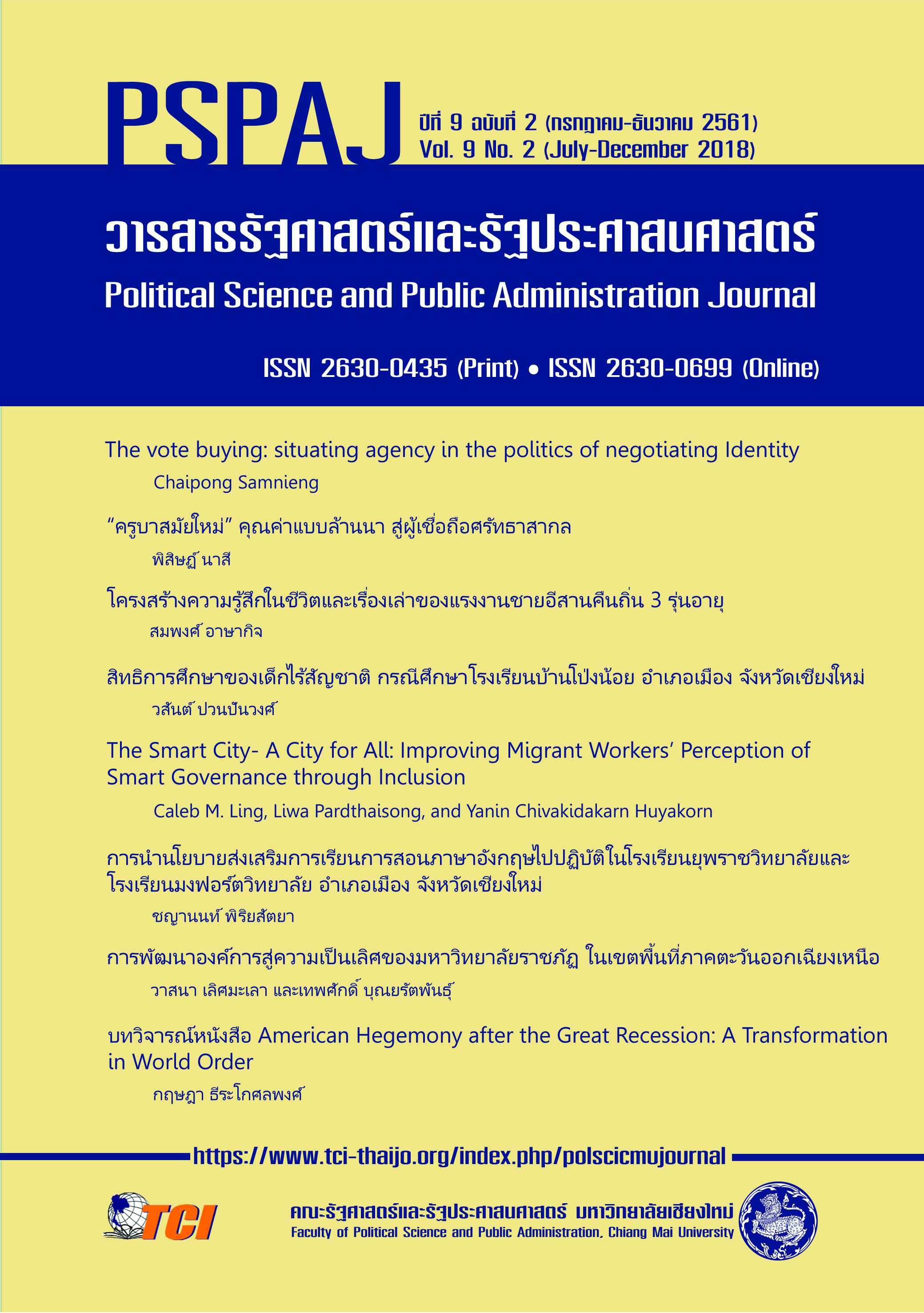Nationality Less Children’s Education Right, in Case Study of Ban Pong Noi School, Amphoe Muang, Chiang Mai Province
Main Article Content
Abstract
The research of the Nationality less Children’s Education right, in case study of Ban Pong Noi School, Amphoe Muang, Chiang Mai Province, Thailand had two objectives (1) to study about their ability to be educated and (2) to study about the management of Ban Pong Noi school to do with Nationality less Children. The Study was Qualitative research follow to social sciences research design, using in-depth interview and observation, furthermore data collection from related documents, researches and field survey methods.
It was found that, part of student of Ban Pong Noi School are Nationality less Children who immigrated to this area and ignored by government to get civil status. They are descendant of alienate worker who work for local employer in and nearby this area. Ban Pong Noi school obey the National Education Act and constitution which notice that everybody must be educated the basic Education in at least 12 years due to state management without any expense. Student affirmative criterion of Ban Pong Noi School is not different from nationality Children, even though these children have no any permit document to show that they are Thai, by the way School has considered an education without racial discrimination which inure to allow the nationality less children to be educated and equal to get education like other nationality children. It’s conform to the laws and rules even more, it’s the management policies of school. The education management of Ban Pong Noi school places importance on education right of nationality less children which according to the rules of education ministry.
Practical recommendation in this research had two point (1) Education right dispensation must aware to pragmatic focus on development of knowledge and abilities for living with others in society. (2) Education right dispensation must aware to all equality for the Nationality less Children’s access to education opportunities thoroughly and uniformly with others base on Human Dignity. Moreover, in this research had Policy recommendation is the state agency and organization involved must wear to practical planning access to the Nationality less Children’s Education right without legal principles only but regardless of the importance of human dignity and the mentality of Nationality less Children’s.
Article Details
- เนื้อหาและข้อมูลที่ลงตีพิมพ์ในวารสารรัฐศาสตร์และรัฐประศาสนศาสตร์ถือเป็นข้อคิดเห็นและความรับผิดชอบของผู้เขียนบทความโดยตรง ซึ่งกองบรรณาธิการวารสารรัฐศาสตร์และรัฐประศาสนศาสตร์ ไม่จำเป็นต้องเห็นด้วย หรือร่วมรับผิดชอบใดๆ
- บทความและข้อมูล ที่ได้รับการตีพิมพ์ในวารสารรัฐศาสตร์และรัฐประศาสนศาสตร์ ถือเป็นลิขสิทธิ์ของวารสาร หากบุคคลหรือหน่วยงานใดต้องการนำข้อมูลไปใช้ประโยชน์ในทางวิชาการ ขอให้อ้างอิงแหล่งที่มาด้วย
References
กระทรวงศึกษาธิการ. (2526). 200 ปี ของการศึกษาไทย. กรุงเทพ: กระทรวงศึกษาธิการ.
กฤตยา อาชวนิจกุล. (2547). คนต่างด้าวในประเทศไทยคือใครบ้าง? จำนวนเท่าไหร่? ระบบฐานข้อมูลแบบไหนคือคำตอบ?. นครปฐม: สถาบันวิจัยประชากรและสังคมมหาวิทยาลัยมหิดล.
กิติวรญา รัตนมณี. (2549). คนนอกอยากเข้า. วารสารนิติสังคมศาสตร์, 9(2), 136-169. สืบค้นเมื่อ 1 มกราคม 2561, จาก https://www.tci-thaijo.org/index.php/CMUJLSS/article/view/72959/58685
ชุติ งามอุรุเลิศ, ดรุณี ไพศาลพาณิชย์กุล, สรินยา กิจประยูร, และอภิชิต ลายสนิทเสรีกุล. (2552). คลังสมองเพื่อคนไร้สัญชาติ: รวมองค์ความรู้สำหรับการจัดการปัญหาด้านสถานะและสิทธิของบุคคล. กรุงเทพฯ: ภาพพิมพ์.
ดุสิต ดวงสา. (2537). การมีส่วนร่วมและการบูรณาการการเรียนการสอนเรื่องเอดส์ในโรงเรียน ในภาคเหนือ. สืบค้นเมื่อ 1 มกราคม 2561, จาก https://www.aidsthai.org/modul/module5/detaillibrary.php?lid=2112
ไทยเอ็นจีโอ. (2548). ปัญหาคนไร้สัญชาติ ในประเทศไทย. สืบค้นเมื่อ 1 มกราคม 2561, จาก https://www.thaingo.org/story/nationless.htm
นิกร เพ็งลี. (2552). นโยบายการศึกษารัฐบาลอภิสิทธิ์. สืบค้นเมื่อ 1 มกราคม 2561 จาก, https://www.familynetwork.or.th/node/15383
นิวัฒน์ ตามี่. (2539). การเข้าถึงโอกาสในการได้รับบริการทางการศึกษาของประชาชนชาวเขา. เชียงใหม่: บัณฑิตวิทยาลัย มหาวิทยาลัยเชียงใหม่.
ประชาไท. (2531). การอพยพของชาวเขาเส้นทางในเขาวงกต. สืบค้นเมื่อ 1 มกราคม 2561, จาก https://prachatai.com/journal/2009/03/20547
ปิ่นแก้ว อุ่นแก้ว. (2550). คนไร้รัฐ ไร้สัญชาติในรัฐไทย. กรุงเทพฯ: วิญญูชน.
เรณู ลีสุวรรณ์. (2535). นโยบายและการจัดการศึกษา โครงการศูนย์การศึกษาเพื่อชุมชนในเขตภูเขา. สืบค้นเมื่อ 1 มกราคม 2561, จาก https://doi.nrct.go.th/ListDoi/listDetail?Resolve_DOI=10.14457/CMU.the.1992.134
วินัย ศรีเรือง. (2544). การจัดการศึกษาสำหรับเด็กด้อยโอกาสทางการศึกษา: ศึกษากรณีโครงการร่มโพธิ์ วัดอุโมงค์ อำเภอเมือง จังหวัดเชียงใหม่. (ศึกษาศาสตรมหาบัณฑิต), มหาวิทยาลัยเชียงใหม่.
ศิริวรรณ เสรีรัตน์, ศุภร เสรีรัตน์, ปณิศา มีจินดา, จิระวัฒน์ อนุวิชชานนท์, และอรทัย เลิศวรรณวิทย์. (2541). การบริหารการตลาดยุคใหม่. กรุงเทพฯ: บริษัท ธีระฟิล์มและไซเท็กซ์ จำกัด.
ศุภชัย สถีรศิลปิน. (2527). ปัญหาการศึกษาของชาวเขาเผ่ามูเซอในบริเวณดอยมูเซอ จังหวัดตาก. เชียงใหม่: สถาบันวิจัยชาวเขา.
สถาบันพระปกเกล้า. (2547). สิทธิและเสรีภาพของชนชาวไทย. สืบค้นเมื่อ 1 มกราคม 2561, จาก https://wiki.kpi.ac.th/index.php?title=สิทธิและเสรีภาพของชนชาวไทย
สาขาวิชารัฐศาสตร์ คณะมนุษยศาสตร์และสังคมศาสตร์ มหาวิทยาลัยราชภัฏนครสวรรค์. (ม.ป.ป.). สรุปสาระสำคัญเกี่ยวกับ พ.ร.บ.การศึกษา. สืบค้นเมื่อ 1 มกราคม 2561, จาก https://sites.google.com/site/bpolsci9/education-knowledge/srup
sarasakhaykeiywkabphrbkarsuksa
สำนักงานคณะกรรมการการประถมศึกษาแห่งชาติ. (2532). นโยบายการศึกษาของประเทศไทย. กรุงเทพฯ: สำนักงานคณะกรรมการการศึกษาแห่งชาติ.

